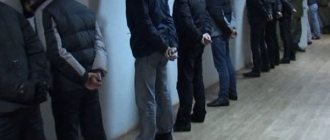TASS DOSSIER. On March 26, 2021, former Minister of the Open Government of the Russian Federation Mikhail Abyzov was detained in a criminal case of theft of 4 billion rubles. The Investigative Committee of the Russian Federation charged him with committing crimes under Part 3 of Art. 210 and part 4 of Art. 159 of the Criminal Code of the Russian Federation (“Creation of a criminal community using official position” and “Fraud on an especially large scale”). The editors of TASS-DOSSIER have prepared material about Article 210 of the Criminal Code of the Russian Federation and high-profile cases of its enforcement.
Article 210
Article 210 “Organization of a criminal community (criminal organization) or participation in it (it)” has been included in the Criminal Code of the Russian Federation since its adoption in 1996. The peculiarity of this article is that criminal liability is established for the very fact of organizing a criminal community or participating in it, regardless of whether any crimes were committed.
Participation and organization (leadership) of a criminal community are classified as grave and especially grave crimes and can be punishable by up to life imprisonment.
According to the current version of Article 210 of the Criminal Code of the Russian Federation, the organizers and leaders of a criminal community face imprisonment for a term of 12 to 20 years, and members of such a criminal group - from five to ten years. At the same time, persons who have committed a crime using their official position can be sentenced to imprisonment for a term of 15 to 20 years, and those who occupy “the highest position in the criminal hierarchy” (Part 4 of Article 210) - up to life imprisonment. Article 210 also provides for punishment in the form of a fine of up to 1 million rubles for the leaders of a criminal group and up to 500 thousand rubles for its participants.
According to data from the Judicial Department of the Supreme Court of the Russian Federation, in 2017, 156 people were convicted under Article 210 of the Criminal Code, and 59 in the first half of 2021 (later data have not been published).
The practice of excluding the qualifying feature “group of persons” when considering criminal cases by courts
The article analyzes judicial practice, analyzes court verdicts on the application of rules on complicity, and reveals the content of the qualifying feature “criminal community (criminal organization).”
Key words: group of persons, organized group, qualifying feature, crime, sentence, court.
The article analyzes the judicial practice, analyzes the sentences of the courts on the application of the rules of complicity, reveals the content of the qualifying feature “criminal community (criminal organization)”.
An analysis of judicial and prosecutorial practice shows that a fairly common phenomenon when courts consider criminal cases is the latter’s exclusion of the qualifying attribute “group of persons” when considering criminal cases.
The reason for this fact is the insufficient level of preliminary investigation of criminal cases, including the lack of a sufficient evidence base to impute this qualifying feature.
Thus, an analysis of criminal law statistics established that in the period from 2013 to 2021, not a single person occupying the highest position in the criminal hierarchy was convicted under Part 4 of Article 210 of the Criminal Code of the Russian Federation. The qualifying feature “committing a crime as part of an organized group” is excluded from the charges of almost every fourth convicted person [3].
An analysis of emerging practice showed that the reason for this is the costs of operating operational services. As a result, according to their developments, most criminal cases are initiated not in connection with the creation and participation in organized criminal groups, but for specific acts committed by members of criminal groups.
The current situation is due, among other things, to the fact that the authorities carrying out operational investigative activities do not pay sufficient attention to documenting the signs inherent in an organized group and criminal community, enshrined in parts 3 and 4 of Article 35 of the Criminal Code of the Russian Federation.
As a rule, during the investigation, investigators focus on collecting evidence on identified crimes committed by members of a criminal association, mistakenly believing that this is enough to charge them with a criminal act as part of an organized group or criminal community.
In connection with the above, there are not isolated cases when the court does not find confirmation of such signs as the stability of an organized group, cohesion, the presence of a hierarchy and structure within groups that are part of a criminal community, the stability of the composition of participants, the close relationship between them, the consistency of their actions, constancy of forms and methods of criminal activity, duration of existence, careful planning and preparation for committing crimes, distribution of roles and income received from criminal activity.
As noted in the Resolution of the Plenum of the Supreme Court of the Russian Federation dated June 10, 2010 No. 12 “On judicial practice in considering criminal cases involving the organization of a criminal community (criminal organization) or participation in it (it)”, based on the provisions of Part 4 of Article 35 of the Criminal Code of the Russian Federation (criminal community ( criminal organization) differs from other types of criminal groups, including an organized group, by a more complex internal structure, the presence of a goal of jointly committing grave or especially grave crimes in order to obtain directly or indirectly financial or other material benefits, as well as the possibility of uniting two or more organized groups for the same purpose. It is noted that a criminal community (criminal organization) can carry out its criminal activities either in the form of a structured organized group, or in the form of an association of organized groups operating under a single leadership. The association of organized groups presupposes the presence of a single leadership and stable ties between independently operating organized groups, joint planning and participation in the commission of one or more serious or especially serious crimes, and the joint performance of other actions related to the functioning of such an association. In turn, the creation of stable connections between various independently operating organized groups should be understood, for example, as the actions of a person to unite such groups in order to carry out joint actions to plan, commit one or more serious or especially serious crimes.
As stated above, the presence of these mandatory features is often not confirmed when criminal cases are considered by the court.
For example, the investigative bodies of the Federal Drug Control Service of Russia in the Vladimir Region have charged M. with a number of attempts at illegal sale of narcotic drugs on a large and especially large scale (7 crimes in total) committed as part of an organized group.
Having examined the presented materials of the criminal case, the court pointed out the lack of evidence indicating the presence of stability, cohesion, and distribution of roles. Marriage and family relations between M. and N., as well as the commission together with Z. of only one of the imputed crimes cannot, in his opinion, be regarded as the creation of an organized group for the systematic commission of criminal acts.
The Frunzensky District Court of Vladimir reclassified the actions of the convicts as committing attempts to sell narcotic drugs by a group of persons by prior conspiracy [6].
Investigators often do not clarify the nature of the relationships between community members, which does not allow the court to present evidence indicating the structured nature of the group, which is one of the signs of a criminal formation in the form of a community (relations within each structure, between structures).
Thus, the Altai Regional Court terminated criminal prosecution under Article 210 of the Criminal Code of the Russian Federation against Z. and others (5 people in total) who created a number of dens for prostitution in the city of Zarinsk, Altai Territory.
During the judicial investigation, it was established that, despite the organized nature of the activities of the designated individuals, their association did not reach the level of cohesion and organization that characterizes the criminal community.
In particular, there were no structural divisions; all members of the group were subordinate to one leader - Z., who was directly involved in the commission of crimes as a perpetrator. The indication in the charge brought at the stage of preliminary investigation that there was a structural division in the group was not confirmed in court.
Under such circumstances, the court terminated the criminal prosecution under Article 210 of the Criminal Code of the Russian Federation due to the lack of corpus delicti in the actions, finding the defendants guilty of kidnapping and human trafficking, involvement in prostitution, organizing prostitution, committed by an organized group [7].
Often, the exclusion of the qualifying criterion “committing a crime as part of an organized group” or the termination of criminal prosecution under parts 1, 2 of Article 210 of the Criminal Code of the Russian Federation is due to violations of criminal procedural legislation during operational search activities and investigative actions, which resulted in the recognition of evidence as inadmissible.
A typical example is the criminal case against T. and others (11 people in total), considered by the Moscow Regional Court.
The court pointed out violations committed during the personal search, drawing up inspection protocols (unspecified corrections, lack of information about interruptions in its production, failure to reflect the facts of the discovery of things, objects and documents subsequently recognized as material evidence), as well as during wiretapping of telephone conversations, failure to provide rights to protection. The violations committed were the basis for the court to declare a number of evidence collected in the case inadmissible, and therefore the accusation based on them was not confirmed in court.
It should be noted that in some cases the qualifying feature in question is excluded due to procedural violations that resulted in the recognition of evidence in criminal cases as inadmissible.
For example, when the prosecutor studied, in accordance with Article 221 of the Code of Criminal Procedure of the Russian Federation, a criminal case received with an indictment from the investigative service of the Federal Drug Control Service of Russia in the Orenburg Region, on charges of I., JI. and D. in the commission of several episodes of sale of narcotic drugs, the investigator’s omissions in terms of determining all the circumstances to be proven were not established.
As a result, the court of first instance excluded the qualifying feature “as part of an organized group” from the charges against the defendants, since the evidence available in the case did not confirm the existence of stable and organized relations between the accomplices. This group operated for a short period of time, there was no leader, and the defendants committed criminal offenses either independently or by prior conspiracy.
In another criminal case initiated against V. and others (6 people in total), the Tyumen Regional Court terminated criminal prosecution under parts 1 and 2 of Article 210 of the Criminal Code of the Russian Federation for lack of corpus delicti; the persons mentioned were convicted of preparation for sale and attempted sale narcotic drugs on a large and especially large scale, committed by an organized group. The court did not find such signs characterizing a criminal organization as the cohesion of the participants, their awareness of the common goals of functioning, the presence of management structures, a common material and financial base formed, inter alia, from contributions from criminal activities, hierarchy and discipline, established rules of relationships and behavior of participants [5].
The above facts indicate in their entirety that the preliminary investigation authorities often do not ensure the collection of a sufficient evidence base in criminal cases that allows persons brought to criminal liability to be charged with committing a crime under Article 210 of the Criminal Code of the Russian Federation. At the same time, it is necessary to point out the omissions made when carrying out operational investigative activities to document the commission of crimes by the criminal community. In the conditions under consideration, strengthening prosecutorial supervision is required, both over the activities of the preliminary investigation bodies and over the activities of law enforcement departments carrying out the preliminary investigation. A proper assessment by the prosecutor of compliance with legal requirements at each of these stages is one of the key guarantees of a positive result in the courts’ consideration of criminal cases of this category.
In addition, it should also be noted that if the commission of a crime under Article 210 of the Criminal Code of the Russian Federation is not confirmed in court, criminal prosecution against the person to whom such charges were brought is subject to termination on rehabilitative grounds, respectively, in accordance with Article 134 of the Criminal Procedure Code of the Russian Federation for the latter The right to rehabilitation is recognized, which is expressed in compensation to a person unreasonably subjected to criminal prosecution for both property and moral damage at the expense of the federal budget.
Thus, the high-quality implementation of operational investigative activities, preliminary investigation, as well as prosecutorial supervision will contribute not only to bringing the perpetrators to justice, but also to the effective use of budget funds.
Literature:
- Criminal Code of the Russian Federation dated June 13, 1996 No. 63-FZ (as amended on August 2, 2019).
- Criminal Procedure Code of the Russian Federation dated December 18, 2001 No. 174-FZ (as amended on August 2, 2019) (as amended and supplemented, entered into force on August 13, 2019).
- Information letter of the General Prosecutor's Office of the Russian Federation dated March 31, 2016 No. 36–47–2016.
- Resolution of the Plenum of the Supreme Court of the Russian Federation dated June 10, 2010 No. 12 “On judicial practice in considering criminal cases involving the organization of a criminal community (criminal organization) or participation in it (it).”
- Verdict of the Tyumen Regional Court dated May 17, 2011.
- Verdict of the Frunzensky District Court of Vladimir No. 1–107/2014 dated 09/04/2014 in case No. 1–107/2014.
- Sentence No. 2–1/2014 2–2/2013; 2–3/2012; 2–36/2011 dated January 31, 2014 in case No. 2–1/2014 Altai Regional Court.
- Shesler A.V. Complicity in crime. Tyumen, 2007.
Tougher punishment
In 2021, Russian President Vladimir Putin submitted to the State Duma draft amendments to the Criminal and Criminal Procedure Codes, which tighten responsibility for the creation and management of an organized criminal community. On March 14, the amendments were adopted by the State Duma of the Russian Federation, and on March 27, they were approved by the Federation Council. The law will come into force after it is signed by the president.
The Criminal Code is supplemented by a new article 210.1 (“Occupying a higher position in the criminal hierarchy”), which establishes a punishment for this crime in the form of imprisonment for a term of eight to 15 years with a possible fine of up to 5 million rubles. When imposing cumulative penalties, the maximum term of imprisonment cannot be more than 30 years, and for cumulative sentences - more than 35 years. In addition, the law provides that persons occupying a higher position in the criminal hierarchy cannot be given a sentence below the lowest limit or a suspended sentence.
A separate element of the crime is the rule relating to meetings of leaders and members of organized crime groups (so-called gatherings) for the purpose of committing at least one of the crimes provided for in Article 210 of the Criminal Code of the Russian Federation. The punishment for this is established in the form of imprisonment for a term of 12 to 20 years with a possible fine of up to 1 million rubles. In addition, fines for organizing and leading an organized criminal group, as well as for using an official position, are increasing - up to 5 million rubles. Participation in a criminal community will be punishable by imprisonment for a term of seven to 10 years with a fine of up to 3 million rubles.






